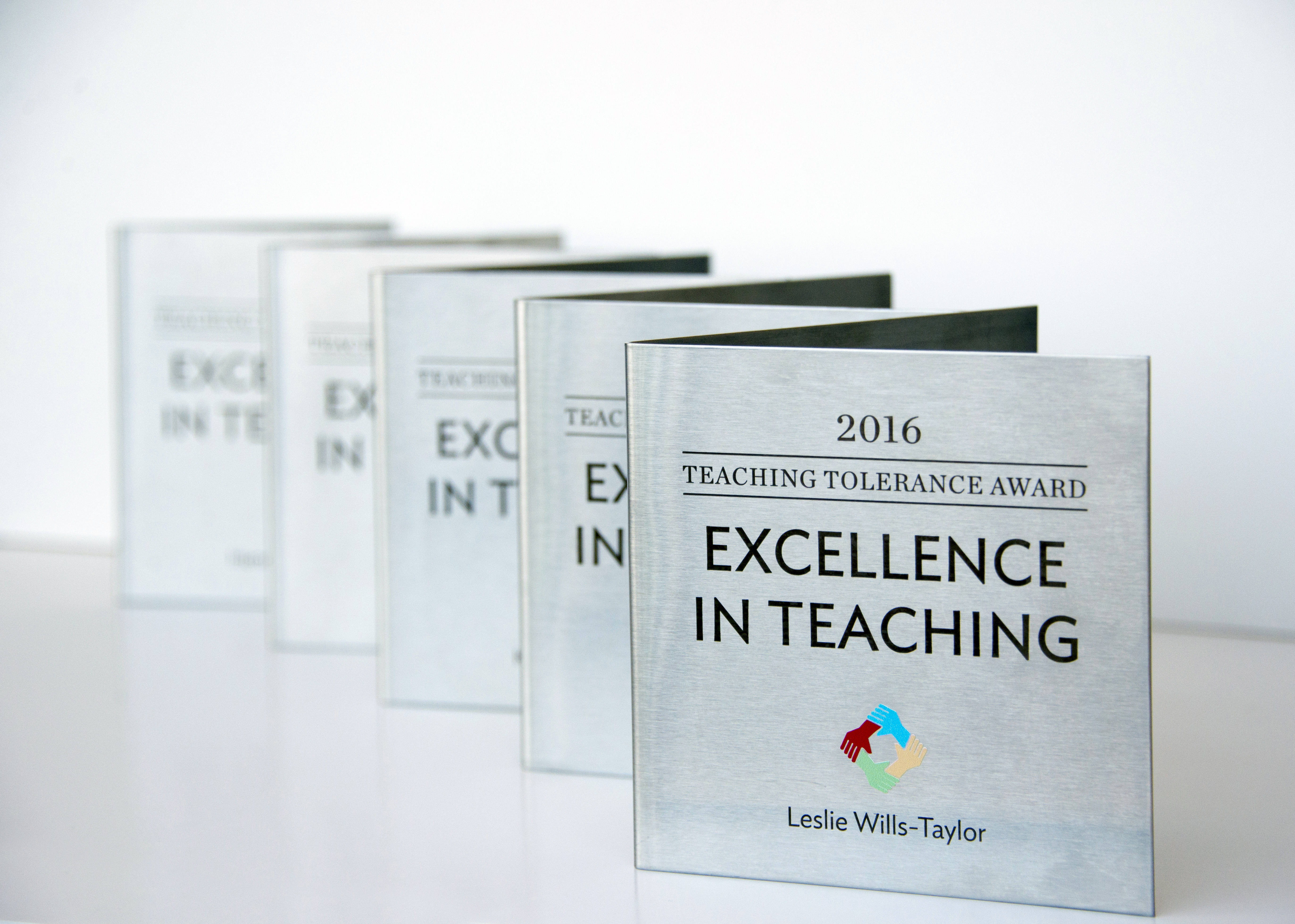The SPLC’s Teaching Tolerance project recognized five teachers with the 2016 Teaching Tolerance Award for Excellence in Teaching – a biennial award given to K-12 educators nationwide who excel at promoting respect and a passion for justice among students.
“These five teachers instill the respect and understanding that’s not only necessary for a student’s success in school but for navigating life in our increasingly diverse country,” said Maureen Costello, Teaching Tolerance director. “They have demonstrated an unwavering commitment to helping students appreciate our differences which helps ensure a better future for all of us.”
The awardees honored at an awards ceremony in Montgomery, Alabama, late last week include:
Frances Weaver
Welsh Valley Middle School — Narberth, Pennsylvania
Weaver is a middle school social studies teacher and a passionate educator. Earlier in her career, she worked to close the achievement gap in under-resourced schools in Philadelphia. By creating academically rigorous and culturally proficient lessons, she was able to help her students gain two reading levels. Weaver now teaches in a more affluent suburban school, but uses many of the same skills, as achievement gaps exist there, too. At the center of all her work are respect, acceptance and the celebration of diversity. Says Weaver, “Conversations at the dinner table are changing in Lower Merion [Pennsylvania] because of my students.”
Karen Schreiner
Aspire Monarch Academy — Oakland, California
Schreiner is a counselor and second-grade teacher who believes education is a democratizing force that advances social justice. Her instructional and behavior-management approaches respond to the cultural and linguistic needs of her students, who are primarily Latino. Her approaches also emphasize social-emotional skills that support students in respectfully connecting with others across lines of difference. Schreiner prioritizes family engagement and brings families’ knowledge and assets into the classroom through units like the one she designed to help her students understand the Black Lives Matter movement.
Christopher Widmaier
World of Inquiry School #58 — Rochester, New York
Widmaier teaches senior-level science in the same Rochester school district he attended as a student and holds leadership roles in a number of school-based and professional organizations, including the Rochester Regional Teacher Empowerment Network. With a firm belief that “the purpose of education is to create communities based on peace, prosperity and inclusion,” he uses responsive teaching and Expeditionary Learning to guide his students in accomplishing these goals and to “give them opportunities to push others to do the same.”
Leslie Wills-Taylor
Woodbrook Elementary School — Charlottesville, Virginia
Wills serves as both a fourth-grade and a diversity resource teacher in central Virginia. During her tenure, she has collaborated with her grade-level team to pilot research-based strategies that engage specific groups, including special education students, African-American males and English language learners. She also organizes family and community outreach events which include a back-to-school neighborhood meet-and-greet, the Martin Luther King Walk-a-Mile for a Cause, school-wide multicultural festivals and classroom reading visits from minority community members. Wills also does research-based professional development for her district.
Cody Miller
P.K. Yonge Developmental Research School — Gainesville, Florida
Miller, a ninth-grade English language arts teacher, is one of four educators working to increase opportunity by ending tracking for honors courses at his school. In addition to his teaching, which focuses largely on multicultural literature, Miller co-sponsors the “De-colonizing Club,” a venue for students to discuss how colonialism has influenced their identities. He also leads school-wide professional development on creating inclusive spaces and curriculum for LGBTQ students. Miller is currently pursuing his doctorate in English education at the University of Florida.
The awards were presented after a two-day event in Montgomery where the winners shared their practices and worked together to create materials for the Teaching Tolerance project to be shared with the nation’s teachers.
During the awards ceremony, Teaching Tolerance unveiled short videos highlighting each awardee’s teaching methods. These videos, which will be shared as a model for teachers across the nation, are available here.
To qualify for the award, teachers must have demonstrated excellence in research-based classroom practices aimed at reducing prejudice, improving intergroup relations and creating an equitable school environment. Each awardee received $2,500.
Teaching Tolerance is dedicated to reducing prejudice, improving intergroup relations and supporting equitable school experiences for our nation’s children. It produces and distributes tools at no cost to teachers, including Teaching Tolerance magazine, online curricula and professional development resources, and multimedia teaching kits that introduce students to various civil rights issues.



